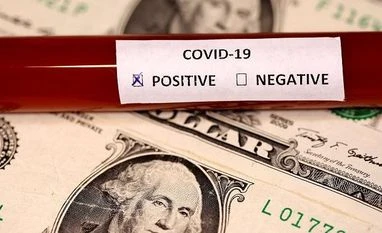US companies are likely to take a $4 trillion blow due to coronavirus (COVID-19) pandemic, says the latest report from Bridgewater Associates – a US-based hedge fund that manages nearly $160 billion in global investments for approximately 350 institutional clients. The global impact, according to Bridgewater is far higher.
“At this point, we estimate US corporate revenue across public and private businesses will decline by roughly $4 trillion. That is a very dangerous decline, and, if not mitigated, it will lead to a long lasting ripple. Since this hit to revenues is happening throughout the world, the total hole globally will be roughly three times that—about $12 trillion,” wrote Greg Jensen, co-chief investment officer at Bridgewater in a co-authored report.
In this backdrop, US companies are likely to cut capex plans by $900 billion (4 per cent of gross domestic product), trim spends on buybacks and mergers & acquisitions (M&As) by around $600 billion (3 per cent of GDP). There will also be meaningful cuts in employment as companies cut back on hiring, which will flow through to the economy.
These estimates, Bridgewater says, have been calculated by triangulating three measures. The first interpolates the lost revenue based on the move in equity markets, using a simple discounted cash flow model. The second uses bottom-up estimates (where corporates or analysts have provided them) and extends them forward using market pricing. The third assumes the hit to revenue by sector in the US is roughly consistent with the by-sector hits already visible in China.
“Without meaningful fiscal or monetary intervention, the $4 trillion figure will mean a decline of over 6 per cent for US GDP this year. We see the most extreme decline occurring in the second quarter, where we expect the level of activity to be more than 10 per cent below 2019 end-of-year levels,” the Bridgewater report says.
Annualised growth numbers for US companies, Jensen says, may drop as much as 30 per cent in the second quarter. As a result, most of the corporate profits and cash on the balance-sheets will be wiped off. “When we go to the sector and company level to convert the revenue shortfall to a cash flow gap, we estimate a shortfall of about $2 trillion, concentrated in energy and travel and leisure, and about equally divided between large and small companies. Many companies will try to fill this gap by drawing credit lines, increasing their debt positions,” Bridgewater suggests.
Body blow to the financial industry
The developments, Jensen feels, will see companies go into default. Market-implied losses, he estimates, will be about $850 billion, around a third of which would be borne by banks alone. “This isn’t likely to be a debilitating problem for the financial system or even the banks, given a large capital cushion and plenty of liquidity, but it will put further strains on the financial sector to tighten standards and pull back,” he says.
That said, Jensen believes the capacities of various governments to deal with this hit vary greatly and will be a major driver of markets going forward. On its part, the US Federal Reserve (US Fed) has been proactive in responding to the developments has decided to relaunch short-term corporate debt purchase and had recently cut short-term rates to a target range of 0 per cent to 0.25 per cent.
As regards India, the Reserve Bank of India (RBI), too, has taken measures in a bid to assuage market concerns. That said, the noise for an economic stimulus from the Indian government is growing stronger. However, weak fiscal situation could limit the government from going aggressive for now, say analysts.
“We think government economic support measures are imminent, but weaker tax collections could limit fiscal space. If the government decides to relax the fiscal deficit target by, say, 1 percentage point (ppt) then this, alongside incremental fuel taxes, could create spending headroom of $18 billion, possibly funding unemployment support, GST cut, infra / housing spend, etc,” wrote Mahesh Nandurkar of Jefferies in a recent report.
Unlock 30+ premium stories daily hand-picked by our editors, across devices on browser and app.
Pick your 5 favourite companies, get a daily email with all news updates on them.
Full access to our intuitive epaper - clip, save, share articles from any device; newspaper archives from 2006.
Preferential invites to Business Standard events.
Curated newsletters on markets, personal finance, policy & politics, start-ups, technology, and more.
)